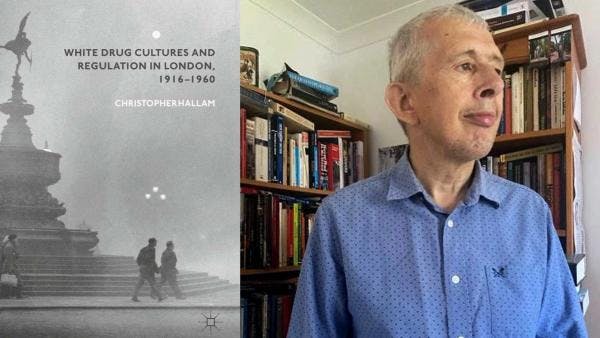Notes on the emergence of drug cultures and regulation in 20th century London — Interview with Christopher Hallam
Editor’s Note: Christopher Hallam is an independent researcher working in academia and civil society organisations, and a Research Associate at the Global Drug Policy Observatory, Swansea University. He is also the author of ‘White Drug Cultures and Regulation in London, 1916-1960‘ (Palgrave Macmillan, 2018). In this ‘Points’ interview we ask him about his book and then his broader research interests in the history and culture of illicit drugs and the regimes that have sought to control them.
Please tell readers a little bit about yourself.
Depending on the context, I usually introduce myself as either a marginal academic or an independent researcher. Either way, I possess a remarkable skill for conducting research that no-one is willing to fund. By discipline, I am a historian who emerged, intellectually speaking, out of the cultural studies debates of the late twentieth century. I like to use a mix of conceptual tools drawn from heterogeneous theoretical frameworks, and I study drugs primarily as cultural substances – symbolic things that people consume, talk about, try to control, fear and celebrate.
What got you interested in the history of alcohol, pharmacy, drugs, or pharmaceuticals?
I have personal experience of ‘addiction.’ I was a heroin smoker when ‘chasing the dragon’ arrived in the UK in the 1980s. I had been interested in drugs since I was a kid, when my father introduced me to Thomas de Quincey (not personally). I understood heroin use as a form of instinctive rebellion against Thatcherite neoliberalism. It wasn’t, but it did make it much more tolerable. Later, I did a degree in sociology, in which I was taught cultural studies by the wonderful Angela McRobbie. Reading Foucault and others, I began to see that everything was made of history, including drugs. We, all of us, walk in a ghosted landscape.
What motivated you to write this book specifically?
I am interested in youth cultures, and in what have been called the ‘countercultures of modernity,’ which include a broad array of movements from psychoanalysis to bohemia to hippies. During archival wanderings, I came across a batch of police and Home Office files on Brenda Dean Paul, who was the notorious/famous ‘society addict’ in late 1920s and 1930s London. I got these files opened under FOI legislation and saw immediately that they were significant. I approached the great Virginia Berridge, and soon I did a PhD under her supervision. This book was born of that research, though it explores considerably beyond Brenda Dean Paul and her set.
